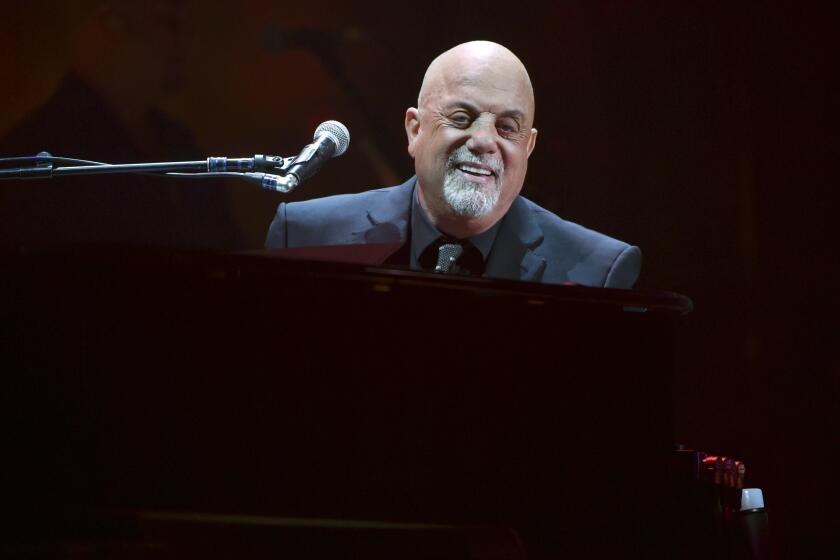New Era for Arena? : Promoter Hopes Big-Name Entertainment Will Revive Pico Rivera Facility
Her long hair pulled back in an elegant bun, pearl earrings dangling like teardrops to her shoulders, Amalia Mendoza--Mexico’s queen of la cancion ranchera , or the country-western song--was carried into the Pico Rivera Sports Arena by two charros (cowboys).
The gesture--along with roses, embraces and pleas for photos and autographs--demonstrated the devotion that fans on both sides of the border have for Mendoza, who had announced her pending retirement two days earlier.
But the performance attended by an estimated 4,000 people marked not only the imminent end of one singer’s career. The new promoters who brought Mendoza to Pico Rivera last weekend say this spring’s performances also mark the beginning of a new era for the financially troubled arena.
Ventura Productions Inc., which now manages the arena, said Mendoza was the first in a string of big-name Mexican entertainers who it hopes will attract record crowds and bring financial security to the city-owned arena.
Looking ahead to the three-day Memorial Day holiday, Ralph Hauser Jr., manager of Ventura Productions, said he expects a performance by Vicente Fernandez, a renowned mariachi singer, to draw 20,000 people.
‘The Hot Ones’
“I go and find the hot ones,” Hauser said. “It’s a good business and this is the only arena in California that can hold a charreada (Mexican forerunner of the rodeo) and 5,000 people.”
The city’s hopes for the arena are riding on Hauser’s predictions for success. Although the arena was heralded as a sure moneymaker when it opened in 1979, it has either lost money for the city or just broken even in every year of operation.
The City Council decided in February to allow the new company to rent the arena, pending approval of a two-year lease agreement that both sides expect to sign within a week. Ventura replaced Hacendado Productions, whose manager says the City Council was unfair to the company that five years ago took over what he described as a money-losing “white elephant.”
Although Ventura will retain the same kind of charreadas put on by Hacendado, Hauser said the company hopes to make a profit
through better promotion, offering a diverse program that also will include American entertainers and community events.
However, Carlos Castuera, manager of Hacendado Productions, predicts the new company “won’t last the year.”
“They don’t have the background and don’t know the business the way I do. They’re not going to make it,” he said. Castuera contended that when his five-year lease expired, his rights were unfairly wrested from him by Ralph Hauser Sr., a former Hacendado partner and now a Ventura investor.
Ralph Hauser Jr. acknowledges he lobbied aggressively for the lease, but he denied that he and his father undermined Castuera. It was, he said, a simple matter of Ventura offering the city more money for the arena.
Firms’ Offers
Hacendado Productions offered to pay $684,308 over five years and asked the city to provide 10 more horse stalls, according to Bill Kent, director of parks and recreation for Pico Rivera.
Ventura Productions’ two-year offer calls for a $136,000 rental fee the first year and $145,000 the second year. The Pico Rivera company retains any funds after expenses and the city pays for maintenance.
“What it came down to was dollars and cents,” Hauser said, adding that he and his father knew the business as well as Castuera, with whom they worked at the arena for five years parking cars.
“I saw the potential of the business and I told my father I wanted to pursue it,” Ralph Hauser Jr. said. His father withdrew from the Hacendado partnership in October and in December the family formed Ventura Productions, he said.
“We had mixed emotions about giving it over to the new operators,” Mayor Alberto Natividad said, “but financial consideration was paramount in the thinking of the City Council.”
Castuera countered: “We created the combination of charreada with entertainment. We’ve been managing the arena (but) just because they offered a little more money, they take the lease away from me? It’s not fair.”
Castuera, who now promotes equestrian events at Griffith Park, said the arena did not yield a profit for his company and that he is still paying off $60,000 in arena debts. When he held the lease, Castuera paid the city a yearly rental fee that grew from an estimated $72,000 in 1980 to $137,000 in 1984, Kent said.
Although the arena made enough money to cover the rental fee collected by the city, Castuera said, Hacendado Productions lost between $120,000 and $130,000 in the 1982 recession, recouping part of the arena losses in 1983 and 1984.
The $4.5-million arena had an $80,000 deficit in 1980 after the city operated it a year. Then the city leased the arena to the Montebello-based Hacendado, which had been formed by local horsemen and businessmen who wanted a place to present charreadas .
$145,000 Budget
In the last four years, City Manager Dennis Courtemarche said, the city has lost a total of $30,000 on the arena, including money it has spent on improvements. The city this year will operate the arena on a $145,000 budget, including the lease fee, Courtemarche said.
“With the new contract we expect to show some profit,” he said. “Sure, we’d like to try to make money, but our goal is to cover the costs of improvements with the revenues we receive. Castuera did an excellent job of getting the thing going and setting a trend, but these people have some new ideas for bringing in other kinds of activities.”
Kent said the city did not ask for a percentage of the profits, because it “would be difficult to determine what constitutes profit and would require monitoring the books.” He added that “maybe there’s more of an incentive when they know what their overhead is and they will try harder knowing that anything above that will be profit.”
The 4,300-seat arena, which includes stables and a campground, is off the San Gabriel River Freeway near the Whittier Narrows Dam. It was built by the city and sits on 80 acres provided by the Army Corps of Engineers.
The corps, which permits cities to use federal land for the construction of recreational facilities, paid $964,343 of $2.2 million spent to build the campground and stables. Under a 50-year lease with the corps, the city pays no rent on the property.
Ventura Productions features charreadas and swap meets at least twice a month, charging $10 a person at shows offered on Saturday and Sunday, with children under age 10 admitted free.
The fans can “get away from it all and feel like they’re back in Mexico for a day,” Hauser said. “They really enjoy it.”
Whittier resident Veronica Alvarado, for example, said, “It’s wholesome entertainment for the family. This is the only place that has the charreadas and frequently brings well-known singers for us to hear. I don’t know of any other city that does this.”
The charreada s include bands and drill teams, the afternoon gaining momentum as men rope or ride wild horses in a competitive sport that once taught cowboys survival in the Southwest. After the equestrian events, the musical entertainment continues.
Last weekend, Mendoza--who sings passionately about love lost, love regained and love betrayed--charmed and moved her audience as she punctuated her songs with tears, hands reaching out in anguish.
Known as “La Tariacuri,” (member of a Mexican Indian tribe), Mendoza, who will not reveal her age, delivered a medley of hits, in a voice as deep and as rich as it has been for the last three decades.
“Que tu cruel adios sea mi Navidad, “ she cried. “Let your cruel goodby be my Christmas gift.”
Daniel Hernandez, 43, a longtime fan, said he and his family attended the charreada because it may have been the only opportunity they would have to see Mendoza.
‘Still a Fan’
Proudly noting that his family is from the Mexican state of Michoacan, where Mendoza was born, Hernandez recalled, “I was about 15 when I first heard her and I’m still a fan.”
“I love her because she sings with a lot of emotion, with what she feels in her heart,” Hernandez said. “Maybe she feels the songs because sad things happened to her. I don’t know, but she’s very divine. When she sings, she makes us feel it, too.”
At a press conference where La Tariacuri announced her retirement, she gave the same explanation for her motivation: “I cry when I sing because I have known sadness in my life,” she said. “I live what I sing. I tell a story and I become that person in it.”
Mendoza said she also performs in the southwestern United States, because she knows it has a large Latino population and “I want to be near them, to offer them my heart.”
Mendoza, whose career was launched in 1954 when she recorded “La Punalada Trapera,” (The Betraying Blow), said she is retiring “while I can still sing, so that I will be remembered that way.”
More to Read
The biggest entertainment stories
Get our big stories about Hollywood, film, television, music, arts, culture and more right in your inbox as soon as they publish.
You may occasionally receive promotional content from the Los Angeles Times.






